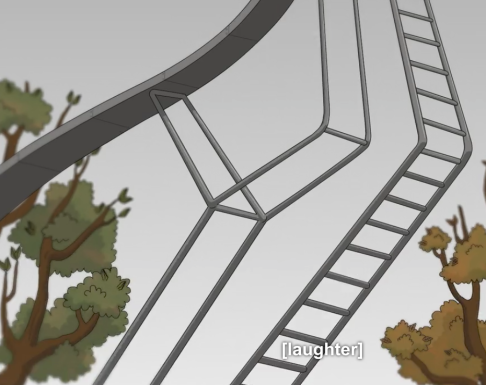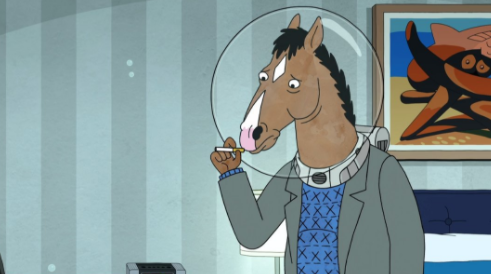
To me, the most poignant moment in ‘Fish out of Water’, the iconic no dialogue episode in the third season of Bojack Horseman wasn’t the twist ending, which was the highlight for most of the people I discussed it with. It’s the part where Bojack is offered money for returning the seahorse newborn home, and for the first time in the life hasn’t expected a material gain for something he’s gone out his way for. His first act of selflessness has gained him no love, only a chance to make money (that he doesn’t need at all). It’s that look of real hope he casts in the general direction of the seahorse babies, unable to recognise which one was his the entire while, as he gets no validation from the entire family that’s not only heartbreaking but also extremely funny. That to me, in a nutshell is what makes the show one of the best comedies to have ever been created, because it celebrates the humour in failure, in tragedy, and even more – the humour in sympathy where there should be none.

This season, Bojack presents ‘Time’s Arrow’, another masterclass in visual storytelling. The entire episode is a series of flashbacks from the point of view of Bojack’s dementia ridden mother, as she struggles to recognise her son and most of her past. Even before getting into what the episode is about I think the very fact that they chose to make an episode centered around his mom Beatrice, shown as a constant villain through the series is slightly eerie. Bojack’s recollections of his mother have throughout the series been painful. It’s very evident that Bojack blames a large part of his ability to not love on his parents, particularly his mother. It’s very evident that he was never appreciated as a kid, from which stems his need for constant approval, often through romance. Switching to the perspective of Beatrice this season, de-villainizes her, because for the first time in four seasons, we’re seeing things from her point of view. Bojack’s mother has reached this stage now where she doesn’t recognise her son. It’s even more infuriating for Bojack because from his point of view, this is the only stage of life where he has a crushing upper hand over her. Her refusal to address him by his name, confusing him with the name Henrietta (the name of her old domestic help) is indicative how bad a state she’s in.
Even more than the premise, it’s how Bojack beautifully blends a very unique visual style to enhance the emotional value what makes this episode stand out. Since we’re seeing memories through his mother’s point of view, some people are are hazy, while some the people who she remembers aren’t. Her first memory of trauma, where she is thrown off a long slide by a group of childhood bullies – a goose and two humans (which her father calls a gaggle of bullies lmao) is oddly deformed. The slide is exceptionally long, way longer than any children’s slide could have been. In her head, being bullied off that slide was a particularly painful memory. The slide’s length adds to her despair. Bojack’s mother remembers her own husband, And the actual Henrietta, whose face has been scribbled over in her memories. As the episode progresses, you realise that Bojack has a stepsister, the result of his father’s affair with their maid.



It amazes me how much Bojack’s writers test their audience. By cutting out dialogue in ‘Fish out of Water’, the writers were forced to make the visual gags in the episode strong enough that they heightened the emotional leverage of the episode. Without any understanding of English, you could watch that episode with no background of who Bojack is and feel a unexplainable grief by his failure to find love in a world which is alien to him. Almost reminiscent of Sophia Coppola’s Lost In Translation, Bojack’s lack of etiquette in the underwater world and his helplessness to calm his anxiety with his usual coping mechanism of alcohol and smoke, is heartbreaking.

Cutting out dialogue in a way cripples both us viewers. Someone in the midst of a tragedy, who is unable to voice his frustration is a paragon of grief. It’s his inability to voice his discomfort that makes Bojack in that episode a victim for a change. Similarly, in ‘Time’s Arrow’, we are crippled this time by visual if not dialogue. Beatrice’s selective memories make us keep wondering how delusional she actually is. Despite what appears to be a very troubled past, there’s no full clarity on what happened to her right until the end of the episode. Beatrice flits between timelines, her memories becoming more painful by the minute, which Bojack has no access to. It’s the last five minutes of ‘Time’s Arrow’ that are really gutting. There is no love lost between Bojack and his mother at this stage. There’s nothing that’s keeping him from locking his mother up in a decrepit old asylum. Yet when his mother finally recognises him, Bojack at her weakest doesn’t remind her that she is going to be lonely for pretty much the rest of his life, that he is done taking care of her. For the first time in the series, he too falls prey to nostalgia and tells her that she is not in an asylum but in their old house, that they’re back in the small part of his memories which bring him happiness (brilliantly revisited in the second episode) He reminds her that they are completely at peace, watching the stars in the sky and relishing a very basic vanilla ice cream. He asks her if she can taste its flavour before the episode cuts to credit. It’s gutting because despite how awful their relationship has been Bojack can’t bring himself to cut loose. There’s a very small part of him that unconditionally loves her and immediately comes forth to let her live her illusions.

I spent the entire third season of Bojack wanting to believe, like everyone else, that though he seemed like a complete asshole on the outside, somewhere very deep down, Bojack is a nice person at heart. I then concluded that he wasn’t. It’s strange, the morality of Bojack Horseman, because despite your troubled past, you don’t get your slack cut for your misdemeanours in the present. This season of Bojack has followed its trademark mix of humour coupled with bouts of real pain and grief. This season has left me feeling that maybe, just maybe, even at your worst, you do deserve –
